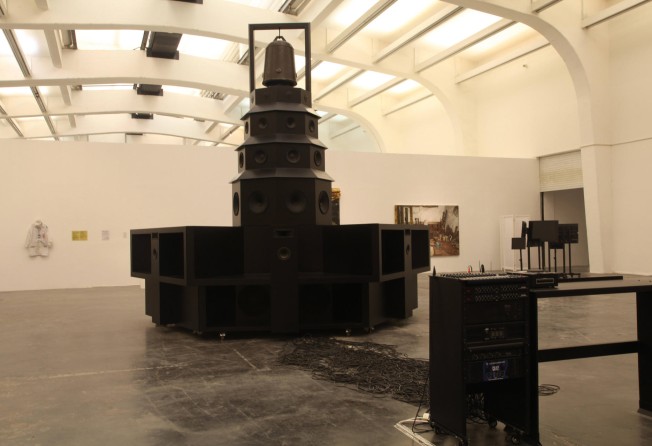Bigger not necessarily better in UCCA's 'On/Off' exhibition

One of the Ullens Centre for Contemporary Art's (UCCA) latest exhibitions, "On/Off", which opened at the beginning of the year and will run until mid-April, has caused quite a stir.
Showcasing 50 young Chinese artists, this group show has prompted critics and collectors to question whether UCCA has been too "aggressive" in its effort to revive itself as a leading centre for Chinese contemporary art.
The centre in Beijing may be filled with artworks, but visitors can't help but feel an emptiness within. Some have questioned aspects of the show - curated by Bao Dong and Sun Dongdong - such as the curatorial direction and selection of the artists. I do not see any problems in their selection of artists, most of whom have well-established reputations, and there are some good works on display here.
Zhang Ding's Control Club (2013), for example, plays on ideas of sensory perception and will, constructing absurd scenes full of contrast. This piece is both a tower-shaped stage - built entirely from speakers - and a reactive sound installation, illustrating a world driven to chaos by excessive control.
In Home (2012), brothers Chen Yufan and Yujun take a stream near their home as a starting point, as a way of bringing the cultural and social experience of "Chinese returning to their hometowns from overseas" into the context of contemporary art.
Two paintings by Liang Yuanwei - Pisces (Left) (2011) and Pisces (Right) (2012) - refer to an incident in the artist's private life. The pattern comes from the same article of clothing, and the vast difference between the two paintings gives form to her ideas of mutability. Liang is a painter whose cold, strong compositions articulate a spatial relationship between colour and pattern. Her working method, which aims for one-time completion and allows for no errors, hints at an extraordinary level of self-control.
UCCA co-founder Guy Ullens and UCCA director Philip Tinari have put much effort into the art scene by investing extensive resources and effort into large-scale exhibitions such as "On/Off".
Such support and passion for Chinese contemporary art is remarkable, especially in these times of economic downturn.
Even though one could be critical about its past exhibitions, such as its tendency to showcase established artists, the UCCA has remained one of the top organisations committed to developing Chinese contemporary art. Regardless of how Ullens handles and organises his private collections (selling them via auction houses) we should still be encouraged by the contributions his institution has made.
About a decade ago, when I was living in Paris, I attended the opening of a Chinese contemporary art show held by Ullens at Espace Pierre Cardin. It was at a time when Paris dominated half the contemporary art market and was a main source of creativity.
Even though the space was small, the force and potential of the artworks were enormous and effectively started the buzz over contemporary Chinese art, an influence that's still felt today.
I'm not sure how Ullens feels about the impact of the current exhibition or the reasons why it stirred such controversy, but the fact it has created a debate makes contemporary art meaningful. No matter whether the artwork is good or bad (some critics used the word "vast, tall and void"), it does offer an insight into the condition and mentality of society.
The artists presented in the exhibition are in their early 20s or mid-30s. There were quite a few works whose dimensions were over 10 metres in size and one may wonder if the artworks really need to be that big to be expressive - unless their intention is to seek the attention of other museums and big-name collectors.
William Zhao is a collector and independent curator